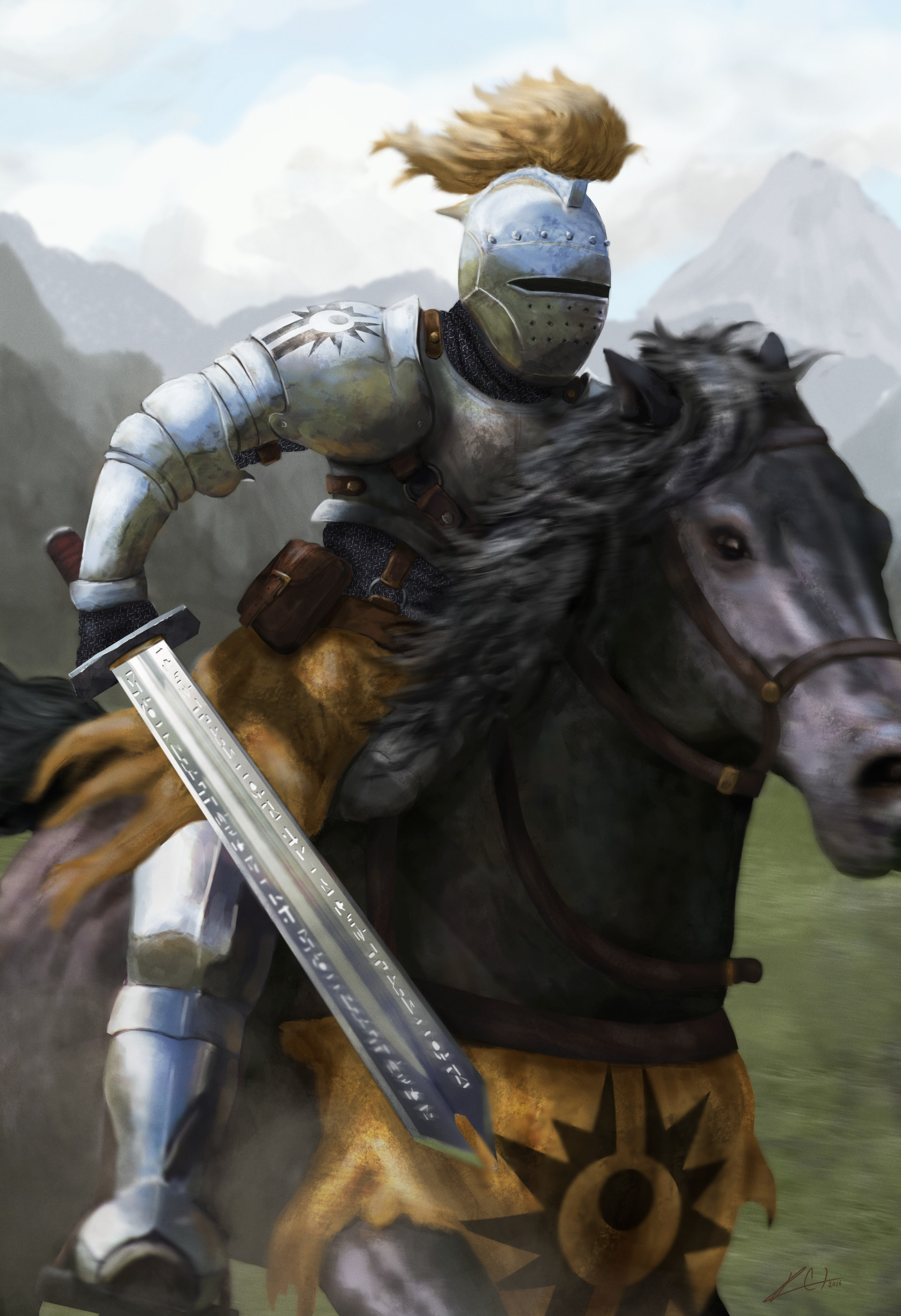Oath of Chivalry (5e Subclass)
Oath of Chivalry[edit]

|
|---|
| Cavalier by David Ceballos |
Paladin Subclass
Paladins who follow the oath of chivalry are devoted followers of the knightly code of honor, and are noble defenders of order, goodness and royalty. These paladins are usually members of nobility, either by birth or merit; some have been trained to become cavaliers since young age, while others have earned their title trough acts of heroism and valor. These paladins tend to be called Cavaliers or Knights, and they usually have strong ties with religious orders devoted to war and discipline, such as Heironeous or St. Cuthbert, although there are some who follow a distorted code of honor, replacing the defense of justice by the pure protection of law, no matter how tyrannical that law may be, which make this oath also common for followers of Hextor. Evil knights tend to interpret the tenets of chivalry in a way that upholds their own power and supremacy.
- Tenets of Chivalry
Though the exact words and strictures of the Oath of Chivalry vary, paladins of this oath share these tenets.
Loyalty. Your word is your bond. Without loyalty, oaths and laws are meaningless.
Forbearance. Control your feelings and actions trough the exercise of patience, restraint and mercy. Don't let your emotions cloud your judgement nor guide your sword.
Hardihood. Be strong and enduring, of body and spirit. Endure the hardships, pain and fear, and let your resilience be a guide to your fellowman.
Generosity. Don't let yourself be corrupted by greed or vanity. Do not accept bribes, don't sell your honor for coin. Share your wealth, in order to bring prosperity to your kingdom.
Justice. Uphold law and bring order to chaos. Let your justice be swift, but kind. Don't let the letter of the law cloud your judgement for injustices, and protect the weak and the helpless from the abuses of the strong.
Honor. Follow the code and uphold its values. Let your life be an example to those who look upon you. Your honor is more important than your life.
- Oath Spells
You gain oath spells at the paladin levels listed.
| Paladin Level | Spells |
|---|---|
| 3rd | compelled duel, longstrider |
| 5th | find steed, warding bond |
| 9th | catnap, haste |
| 13th | death ward, find greater steed |
| 17th | circle of power, geas |
- Channel Divinity
When you take this oath at 3rd level, you gain the following two Channel Divinity options.
Champion Challenge. As a bonus action, you issue a challenge that compels other creatures to do battle with you. Each creature of your choice that you can see within 30 feet of you must make a Wisdom saving throw. On a failed save, a creature can't willingly move more than 30 feet away from you. This effect ends on the creature if you are incapacitated or die or if the creature is more than 30 feet away from you.
Knightly Charge. You can use your Channel Divinity to make a valiant charge against an opponent. As a bonus action, you can move up to 30 feet and make a single melee weapon attack with advantage. On a hit, you cause the attack's normal effects, plus additional damage equal to 2d6 for every 10 feet you have moved before the attack and is knocked prone.
- If you are on top of a controlled mount, you can move up to your mount normal speed with this bonus action, instead of your own speed.
- Warding Maneuver
At 7th level, you learn to fend off strikes directed at you, your mount, or other creatures nearby. If you or a creature you can see within 5 feet of you is hit by an attack, you can roll 1d8 as a reaction if you're wielding a melee weapon or a shield. Roll the die, and add the number rolled to the target's Ac against that attack. If the attack still hits, the target has resistance against the attack's damage.
You can use this feature a number of times equal to your Charisma modifier (a minimum of once), and you regain all expended uses of it when you finish a long rest.
- Challenging Strike
Beginning at 15th level, whenever you cause additional Divine Smite damage to a creature, you can spend a 1st-level spell slot to cast compelled duel against that creature, without spending a bonus action, and without requiring concentration.
In addition, whenever you are under the effects of compelled duel, you gain the benefits of heroism for the duration.
- Legendary Knight
At 20th level, as an action, you gain the following benefits for 1 minute:
- You can use your Channel Divinity options at will, without spending uses. You can't have more than one creature challenged by your Champion Challenge at the same time.
- You can use your Warding Maneuver at will, without spending any uses.
- You have resistance to slashing, piercing and bludgeoning damage.
Once you use this feature, you can't use it again until you complete a long rest.
Back to Main Page → 5e Homebrew → Character Options → Subclasses
